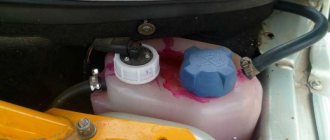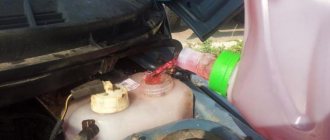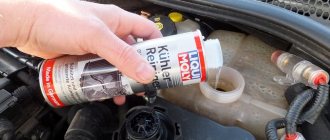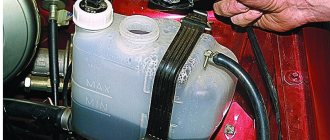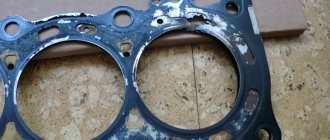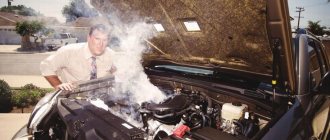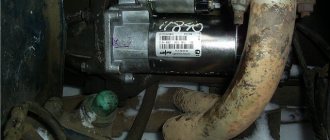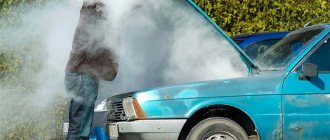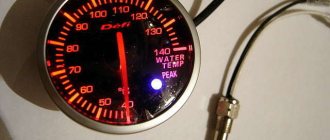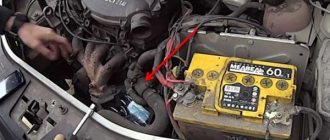The cooling system in a car is one of the main peripheral organs that ensures normal engine operation. Antifreeze pipes pass through the most dangerous areas of the engine for overheating, and are also connected to the interior heater, which makes the system multifunctional and very important for the normal operation of the car. Do you think that the stove is not such an important element of comfort and overall usability? Try driving in 20-degree frost without it. You will clearly feel all the delights of such operation and will be able to understand exactly how important this element is in the car. But the stove is only part of the cooling system. The main parts of its operation are the thermostat, pipes through which coolant circulates, as well as a radiator for cooling antifreeze or antifreeze.
If one of these elements is not working properly, there may be a problem with the cooling system. Such problems will lead to the engine overheating, the pistons will change sizes due to metal expansion when heated, friction will increase significantly, and the engine will simply fail. It is important to notice overheating in time to eliminate this process and remove all risks from operating your own car. That is why the dashboard in any car contains information about what the coolant temperature is at the moment. Let's look at what problems cause the machine to boil.
Cooling system malfunctions are the main causes of the problem
If the car starts to boil, the first thing you need to do is check that all the intricacies of the cooling system are working properly. It is enough for an air lock to form in the radiator for the liquid to overheat and not perform the necessary tasks of cooling the power unit. Therefore, in most cases, it is a system malfunction that is to blame for your car boiling. First of all, you need to check the active elements of the system, which are the main characters of this system. In modern cars, testing should be carried out with the following devices:
- thermostat - if the thermostat does not open a large coolant circulation circle, which includes the main radiator, the car will constantly overheat and quickly gain temperature, the car will boil already in the tenth minute after starting the engine;
- radiator fan - the fan should turn on in cases where the fluid temperature reaches the operating temperature, on different cars this value is set in different modes, in most cases cars boil due to a fan malfunction only in traffic jams or other difficult operating conditions;
- the radiator itself - it often happens that the radiator is clogged or punctured, it cannot perform its tasks properly, also bent plates and physical damage to the radiator are an important part of its malfunction; if this part malfunctions, the liquid in the cooling system will boil;
- cooling system pipes - these parts are also worth checking; if the car suddenly boils, it is quite possible that one of the pipes leading to or from the radiator is pinched and does not allow a sufficient amount of coolant to pass through, then the system will overheat.
These are the main aspects that cause a car to fail in most cases. Most of them are related to the hardware of the machine, and most problems can be fixed quite cheaply. If, of course, you have to buy a thermostat and change it at a service center, you will spend a lot of money, but the result will be quick and flawless. Your car will drive normally again, the sensors will not complain about high coolant temperatures or even block engine operation using the capabilities of the on-board computer. If the car is not equipped with these elements, it is quite possible that the hot engine will jam or quickly wear out due to increased friction.
The car boiled - consequences
If the system is boiling, the degree of damage to the channels varies. Often this does not threaten anything dangerous, the owner of the car is simply limited by fear. But if an overheated engine stalls (and the battery has nothing to do with it), this may indicate the following things:
- destruction of the cylinder head seal;
- block damage;
- critical decrease in antifreeze level;
- damage or deformation of valves;
- Damage to valve stem seals.
Cylinder head destruction
The consequences of boiling are eliminated depending on the specific situation. Usually everything is solved by restoration and grinding of the cylinder head. Seizing of pistons in liners is rare. However, in this case, repairs seem impractical. It is much easier and cheaper to install another motor.
Constant overheating of the liquid and the release of steam is a symptom of a decrease in the amount of coolant. In this case, the engine will not cool properly even after cooling. If you do not take measures to refuel and simply cool the unit, the antifreeze will boil again. Heating in the area of combustion chambers and other heat-loaded parts will increase. The internal parts of the unit will become unusable, and the cylinder block itself will collapse.
Popular brands:
Volkswagen Passat
Engine problems - another option for boiling coolant
If you have poured high-quality liquid into the cooling system, checked the serviceability of all elements of the system, before this the car was working normally, but now the liquid begins to boil in some situations, it’s time to check the engine. It is possible that the parts have changed their position, which causes too much friction and significant heating of the unit during operation. In this case, it is best to use the help of a specialized service. Most likely, you will find one of the following very complex problems with the engine:
- slight deformation of certain parts in the engine system, which caused an increase in friction due to a change in the position of the working moving elements inside the power unit;
- significant wear of the piston group, which causes uncontrolled friction of parts, large gaps between the walls of various elements; only major repairs, and on some cars, engine replacement, can save you from these symptoms;
- problems in the gearbox, which significantly increases the load on the engine; in particular, in such situations, problems are to blame that cause the engine to experience additional load to turn the gearbox elements;
- constant heavy loads on the power unit, transportation of a significant amount of cargo, as well as transportation of trailers, which is not provided for by the operating characteristics, violation of the vehicle’s load-carrying capacity;
- running the engine at high speeds for quite a long time, for example, if you forgot to change gear on the highway and accelerated at a lower speed, pressing the pedal to the floor more and more.
Engine overheating is sometimes a normal consequence of not very reasonable actions by the driver. It is better to avoid such situations and also monitor the health of the power unit in the car system. This will allow you to permanently remove all troubles associated with overheating, boiling and other problems. It should be noted that if you carry out normal maintenance according to a regular plan created by the factory, and also do certain diagnostics of all important units, then such problems can be avoided. It is also worth constantly adhering to certain operating conditions of the machine, without violating the recommendations given by the manufacturer.
Problems with the coolant itself - the third boiling option
Another way to make a car boil is to pour some unknown liquid into the cooling system. Sometimes it’s enough to buy a strange, unsealed can of horrifyingly colored liquid labeled antifreeze without any special identification marks to make the car boil. Problems are also possible if the amount of antifreeze or antifreeze is less than provided by the manufacturer. There are marks in the coolant reservoir that need to be taken into account when operating the car, but the fluid level can only be measured when the car is cold. The main problems with antifreeze may be the following:
- a fluid leak somewhere in the system, the presence of a leak through which some of the antifreeze has leaked, and now the fluid heats up much faster and begins to boil when you continue to operate the car in difficult conditions;
- also, if the antifreeze level has dropped below the neck of the expansion tank, additional air pockets may form in the radiators, which complicates the passage of fluid in the system;
- the quality of antifreeze or antifreeze determines the likelihood of the liquid boiling in certain situations; on a working machine, high-quality coolant will never boil;
- counterfeit of your usual antifreeze or antifreeze - there is a certain risk of buying a counterfeit in any store, except for an official service center that supplies spare parts directly from manufacturers.
Buy antifreeze from stores or service centers that guarantee its high quality. This is a very important point that will determine the quality of operation of the car in the near future. It is important to properly prepare the car for the summer and winter operating seasons. When preparing, it is worth considering important points, such as the cooling system and its operation, the quality of all technical fluids, as well as the serviceability of important components of your car. Only this will ensure normal operation and will not make you wonder why the machine boiled. Watch a short video about what to do if your car overheats:
Why does the car boil, possible reasons
Structurally, the cooling of a modern engine is not entirely ideal. This is the answer to the question why the car boils. The system is a combination of liquid and water type. Despite this, it has many disadvantages. The main problem is ensuring constant and efficient heat removal.
Usually difficulties begin in a closed circle system. This is air getting inside, antifreeze congestion, a decrease in the amount of coolant, scale. Because of this, the lines begin to work worse, individual elements are damaged, corrosion forms on internal surfaces - all these are the causes of boiling.
Engine cooling system diagram
The air system is entirely dependent on the operation of the fan. Violations cannot be ruled out here either. As a rule, they are associated with a drive, sensors, and electrical circuits.
In fact, the engine boils due to many reasons. It is very difficult for a novice driver to figure it out on the fly. It is customary to distinguish between two main groups: cooling failures and problems in the power plant itself.
Let's consider each case separately.
- The thermostat is stuck. One of the common boiling problems. The element stops due to wear in the closed position. Antifreeze does not pass into the radiator, which causes overheating. A thermostat malfunction is determined as follows: on a warm engine, touch any pipe with your hands. If it is cold, then this will confirm the guess.
- The radiator is clogged due to frequent driving on country roads. Debris is easy to see on the outer walls, but if it gets into the inner niches, you will have to thoroughly rinse everything. This will prevent the car from boiling.
- Faulty pump. In this case, the liquid does not circulate normally through the system. Quite often in this case, the water pump makes a squeaking, whistling or knocking noise.
- The fan is not working. This usually happens due to a broken temperature sensor.
- Faulty expansion tank. As you know, it has a special lid with a built-in valve. Its purpose is to remove excess pressure. If a breakdown occurs, then problems are immediately observed in the antifreeze supply devices. Because of this, the refrigerant begins to boil.
- Air jams. They are formed when the system is not properly filled with antifreeze or its level is insufficient. An air gap can be created in individual elements and contribute to boiling of the coolant.
Causes of boiling are also clogged lines, leaks, and the use of low-quality coolant.
Overheating is also caused by problems with the motor. Problems with the gearbox are also not uncommon, when, due to wear of the gearbox mechanisms, the unit begins to work under load.
Let's sum it up
A boiling car is a clear problem that needs to be addressed immediately. Owners of high-quality Japanese or German cars know that even increasing the operating temperature of the engine by a few degrees can cause some discomfort for the power unit. Interestingly, this increases fuel consumption, reduces engine output and power, reduces its service life and is generally no different. An extremely important note is that this is relevant not only for expensive and functional, technologically advanced machines. VAZ also loves exceptionally clear engine operating temperatures.
If the power unit in your car begins to boil, it is worth performing all the above procedures and checking all the units and systems that may be involved. Most likely, you are dealing with exactly these problems. However, options are possible. The machine can also boil due to its functional features or too old age. These are the features of increasing degrees in the cooling system of your car. Have you ever encountered the problem of overheating of the coolant in your car?
What can boiling liquid in the engine cooling system cause?
So, we have a little understanding of the signs, causes and characteristics of boiling antifreeze or antifreeze. Now let's look at the common mistakes that inexperienced drivers make when the engine boils.
First, if the coolant boils and steam comes out, then we can say that the amount of liquid in the system has decreased. It turns out that even after the engine cools down, the engine will not cool properly.
If you do not add fluid, but simply cool the engine, then start the internal combustion engine and continue driving, then the remaining coolant in the system will quickly boil again. Taking into account the fact that the amount of liquid after boiling is reduced, heating in the area of the combustion chambers and other heat-loaded elements will greatly increase. A similar problem can also occur with a faulty pump.
In this case, the material from which the internal combustion engine parts are made will expand, individual elements will begin to collapse, and the engine itself will stall due to breakdown or jam. Even if jamming has not occurred, the cylinder head or cylinder head may crack due to overheating, the cylinder head is deformed at the point of contact with the cylinder block, the gasket between the cylinder head and cylinder head burns out, etc.
In parallel with this, a conditional boiling of the engine oil may occur. The fact is that the lubricant is designed to heat up to 150 degrees Celsius. Further heating leads to loss of lubricating, protective and other properties. Naturally, overheating of the internal combustion engine leads to the fact that the oil will also overheat and boil.
In some cases, eliminating the consequences of overheating is solved by repairing and grinding the cylinder head. Also sometimes cracks in the block or “head”, etc. are repaired. In other situations, the engine may completely fail, that is, cannot be restored.
It is important to understand that attempts to get there under your own power in a car without antifreeze or with a small amount of it can be accompanied by very serious consequences. The main thing is to prevent damage to the cylinder block, pistons, cylinder head, etc.
